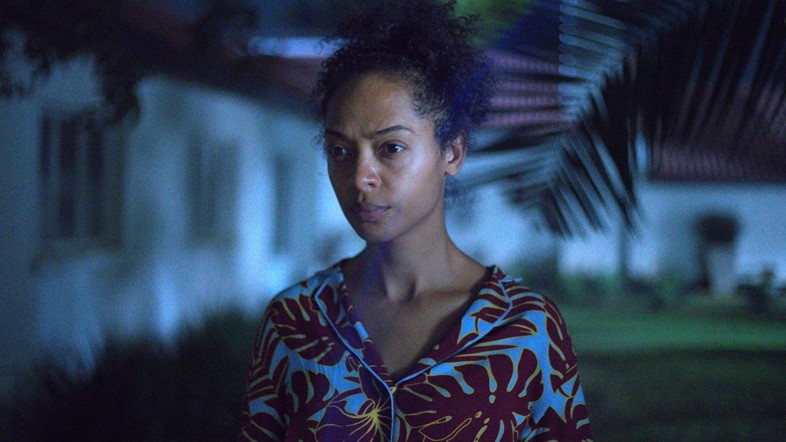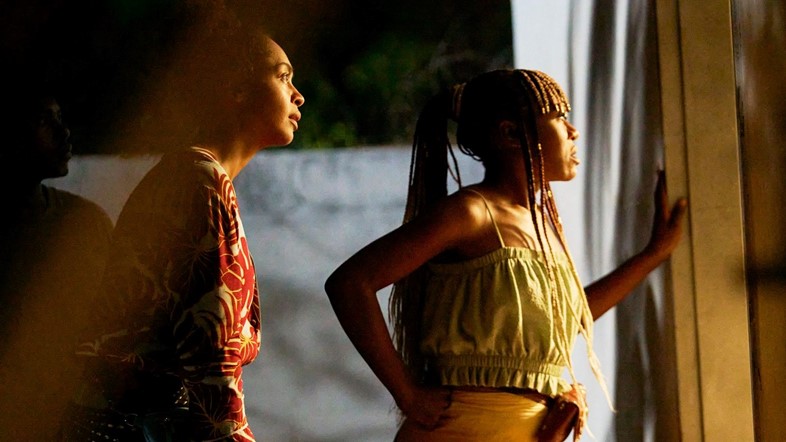
Rewrite
Rungano Nyoni’s comedy of manners lifts the veil of silence drawn over victims of sexual abuse in a middle-class Zambian family
Rungano Nyoni has an instinctive horror of what she calls the ‘one in ten’ film. She spent long hours fighting with the edit of her first feature, I Am Not a Witch, to put strange comic fingerprints on a film dealing with the (very real) issue of young girls in Zambia being accused of witchcraft. “I’m always fighting earnestness in the cutting room, because I don’t want to make some kind of educational film,” says Nyoni. “You know those films where at the end it goes, ‘One in ten Zambian people something-something-whatever?’ I remember watching the first cut [back] like, ‘Oh my God, I’m making that film’. It’s definitely a balancing act.”
Her follow-up, On Becoming a Guinea Fowl, lifts the veil of silence drawn over victims of sexual abuse in a middle-class Zambian family, and does it in a way that is unmistakably Nyoni. Shula (Susan Chardy) is driving home from a party one night when she comes across the body of her uncle Fred, dead from an apparent seizure on his way back from the local brothel. Shula, on a family visit from abroad, seems unmoved by his death, but plans are drawn up for the funeral where dark secrets about the deceased threaten to spill into the open. What follows is a surreal comedy of manners underscored by tragedy, Nyoni using the complex rites of a Zambian funeral as the backdrop to Shula’s alienation from her family and, finally, herself.
As with her debut, it’s an audacious mash of moods and tones that stems in part from Nyoni’s own background, as a Lusaka native who moved to Wales with her family at the age of eight. Dreamlike touches abound: in the opening sequence, Shula wears a glittering get-up swiped from a Missy Elliott video, a strange sci-fi vision on a dusty back road at night. And a haunting scene at the local uni, where Shula’s niece is staying, the student halls are flooded with water, a fact that passes without comment as characters literally wade through corridors.
“[My work is] a reflection of how I see life in Zambia which is always a mixture of really tragic things happening next to absurd things,” says Nyoni, who just moved back to the country with her partner, a producer on the film, and two-year-old daughter. “What I love about it here is we have this humour about really dark situations. It’s the same thing with funerals. I’ve been to so many, perhaps because your extended family is your family here, your friends and colleagues are your family. Life and death is very much part of our lives in a different way than I experienced when I was in the UK. It’s something I really wanted to capture as an outsider.”

Typically, says Nyoni, Zambian funerals unfold over three or four days, with women expected to wear their grief very much on their sleeves. (The menfolk, very much a marginal presence in the film, stay outdoors in tents.) For an outsider, the effect is surreal in ways that can mask the highly choreographed nature of the performance. In one scene, Shula’s face is a mask of impassivity as she opens the front door and three women come crawling in on all fours singing songs about death. In another, Fred’s young widow finds herself berated by relatives for crying “like a mosquito”, as if they were members of the grief police. “It’s actually very reserved within all this outwardness,” Nyoni explains, “there are rules about what’s allowed to come out and what’s what has to remain hidden.” What remains hidden in this case, of course, is a truth the whole family is complicit in hiding.
If Shula is a closed book for much of the film, her cousin, Nsansa, is the complete opposite. Courageously played by Elizabeth Chisela, she’s an exhibitionist drunk who irritates and finally wins over Shula after sharing a terrible secret that she pitches as a ‘funny’ anecdote. “That scene came from a specific incident,” says Nyoni. “I’ve seen denial in all its forms. I know people who have experienced abuse, I know their stories because they’ve opened up to me and I’ve sat in a room with them when they’re speaking about someone else who has experienced abuse, but they can never say, ‘Oh, by the way, that happened to me.’

The terrible weight of silence in the film found its way on set, says Nyoni, who says “there were times people had to sort of break off, but for the life of you [you can’t] ask them, so you give them space but no one would speak about it. They would tell me it’s so funny you’re speaking about these things, but then they’d sort of croak up, and you could tell they wanted to say something but they couldn’t do it. It was tough, because of all the times to open up that should be it, but nobody could.”
After wrapping on the film, Nyoni swore off working in Zambia again. The shoot was too heavy, the challenges of working in a country where 24-hour blackouts are commonplace. “But now it looks like I might be,” says Nyoni, sounding faintly troubled by the notion. (She also has plans to make a sci-fi film in Botswana.) “I don’t know, Zambia wasn’t really a place I wanted to set stories in, it just sort of came organically. I guess that’s just what moved me.”
On Becoming a Guinea Fowl is out in UK cinemas now.
in HTML format, including tags, to make it appealing and easy to read for Japanese-speaking readers aged 20 to 40 interested in fashion. Organize the content with appropriate headings and subheadings (h1, h2, h3, h4, h5, h6), translating all text, including headings, into Japanese. Retain any existing
tags from
Rungano Nyoni’s comedy of manners lifts the veil of silence drawn over victims of sexual abuse in a middle-class Zambian family
Rungano Nyoni has an instinctive horror of what she calls the ‘one in ten’ film. She spent long hours fighting with the edit of her first feature, I Am Not a Witch, to put strange comic fingerprints on a film dealing with the (very real) issue of young girls in Zambia being accused of witchcraft. “I’m always fighting earnestness in the cutting room, because I don’t want to make some kind of educational film,” says Nyoni. “You know those films where at the end it goes, ‘One in ten Zambian people something-something-whatever?’ I remember watching the first cut [back] like, ‘Oh my God, I’m making that film’. It’s definitely a balancing act.”
Her follow-up, On Becoming a Guinea Fowl, lifts the veil of silence drawn over victims of sexual abuse in a middle-class Zambian family, and does it in a way that is unmistakably Nyoni. Shula (Susan Chardy) is driving home from a party one night when she comes across the body of her uncle Fred, dead from an apparent seizure on his way back from the local brothel. Shula, on a family visit from abroad, seems unmoved by his death, but plans are drawn up for the funeral where dark secrets about the deceased threaten to spill into the open. What follows is a surreal comedy of manners underscored by tragedy, Nyoni using the complex rites of a Zambian funeral as the backdrop to Shula’s alienation from her family and, finally, herself.
As with her debut, it’s an audacious mash of moods and tones that stems in part from Nyoni’s own background, as a Lusaka native who moved to Wales with her family at the age of eight. Dreamlike touches abound: in the opening sequence, Shula wears a glittering get-up swiped from a Missy Elliott video, a strange sci-fi vision on a dusty back road at night. And a haunting scene at the local uni, where Shula’s niece is staying, the student halls are flooded with water, a fact that passes without comment as characters literally wade through corridors.
“[My work is] a reflection of how I see life in Zambia which is always a mixture of really tragic things happening next to absurd things,” says Nyoni, who just moved back to the country with her partner, a producer on the film, and two-year-old daughter. “What I love about it here is we have this humour about really dark situations. It’s the same thing with funerals. I’ve been to so many, perhaps because your extended family is your family here, your friends and colleagues are your family. Life and death is very much part of our lives in a different way than I experienced when I was in the UK. It’s something I really wanted to capture as an outsider.”

Typically, says Nyoni, Zambian funerals unfold over three or four days, with women expected to wear their grief very much on their sleeves. (The menfolk, very much a marginal presence in the film, stay outdoors in tents.) For an outsider, the effect is surreal in ways that can mask the highly choreographed nature of the performance. In one scene, Shula’s face is a mask of impassivity as she opens the front door and three women come crawling in on all fours singing songs about death. In another, Fred’s young widow finds herself berated by relatives for crying “like a mosquito”, as if they were members of the grief police. “It’s actually very reserved within all this outwardness,” Nyoni explains, “there are rules about what’s allowed to come out and what’s what has to remain hidden.” What remains hidden in this case, of course, is a truth the whole family is complicit in hiding.
If Shula is a closed book for much of the film, her cousin, Nsansa, is the complete opposite. Courageously played by Elizabeth Chisela, she’s an exhibitionist drunk who irritates and finally wins over Shula after sharing a terrible secret that she pitches as a ‘funny’ anecdote. “That scene came from a specific incident,” says Nyoni. “I’ve seen denial in all its forms. I know people who have experienced abuse, I know their stories because they’ve opened up to me and I’ve sat in a room with them when they’re speaking about someone else who has experienced abuse, but they can never say, ‘Oh, by the way, that happened to me.’

The terrible weight of silence in the film found its way on set, says Nyoni, who says “there were times people had to sort of break off, but for the life of you [you can’t] ask them, so you give them space but no one would speak about it. They would tell me it’s so funny you’re speaking about these things, but then they’d sort of croak up, and you could tell they wanted to say something but they couldn’t do it. It was tough, because of all the times to open up that should be it, but nobody could.”
After wrapping on the film, Nyoni swore off working in Zambia again. The shoot was too heavy, the challenges of working in a country where 24-hour blackouts are commonplace. “But now it looks like I might be,” says Nyoni, sounding faintly troubled by the notion. (She also has plans to make a sci-fi film in Botswana.) “I don’t know, Zambia wasn’t really a place I wanted to set stories in, it just sort of came organically. I guess that’s just what moved me.”
On Becoming a Guinea Fowl is out in UK cinemas now.
and integrate them seamlessly into the new content without adding new tags. Ensure the new content is fashion-related, written entirely in Japanese, and approximately 1500 words. Conclude with a “結論” section and a well-formatted “よくある質問” section. Avoid including an introduction or a note explaining the process.


